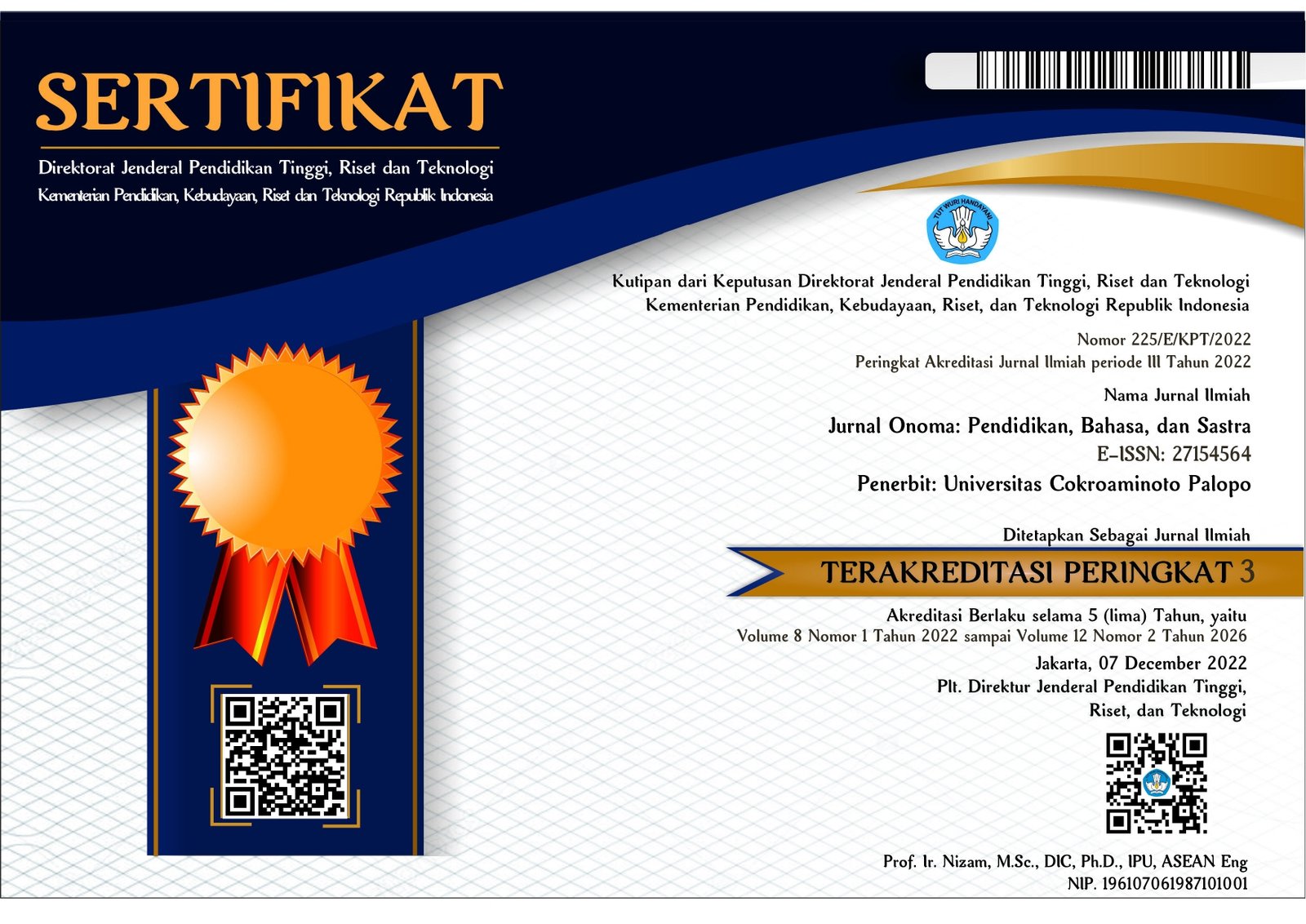An Analysis Of Impoliteness Strategies Of Genshin Impact Player In 1st Anniversary Posted On Twitter
https://doi.org/10.30605/onoma.v10i1.3220
Keywords:
pragmatics, impoliteness strategies, Genshin impactAbstract
This study aimed to analyse the strategy of impoliteness of Genshin Impact player on twitter using pragmatic approach. The purpose of this study was to find the type of impoliteness and function of impoliteness. The data for this research were taken from comments contained in the twitter @genshinimpact account. This study analysed based on the type of impoliteness strategies (Culpeper, 1996) and function of impoliteness proposed by Culpeper (2011). Related to the types of impoliteness, the result of the analysis show hat there are five types of impoliteness strategies in the comment ;(1) Bald on record impoliteness, (2) Positive impoliteness. (3) Negative impoliteness, (4) Sarcasms or mock politeness, (5) withhold politeness. Also, three functiones of impoliteness; (1) Affective impoliteness, (2) Coercive impoliteness, (3) Entertaining impoliteness. The utterances that show impoliteness are uttered by the player commented on twitter.
Downloads
References
Apriliyani, Vira, Hamzah, Hamzah, & Wahyuni, Delvi. (2019). IMPOLITENESS STRATEGIES USED BY MALE AND FEMALE HATERS OF HABIB RIZIEQ AND FELIX SIAUW FOUND IN INSTAGRAM COMMENTS. English Language and Literature, 8(1). https://doi.org/10.24036/ell.v8i1.103213 DOI: https://doi.org/10.24036/ell.v8i1.103213
Brown, Penelope, & Levison, Stephen. (1987). Politeness: Some Universals in Language Usage. In Cambrigde University Press. DOI: https://doi.org/10.1017/CBO9780511813085
Bustan, Elaf Saad, & Alakrash, Hussien Mohammad. (2020). An Analysis of Impoliteness Strategies Performed by Donald Trump Tweets Addressing the Middle East Countries. Global Journal of Social Sciences and Humanities, 1.
Culpeper, Jonathan. (1996). Towards an anatomy of impoliteness. Journal of Pragmatics, 25(3). https://doi.org/10.1016/0378-2166(95)00014-3 DOI: https://doi.org/10.1016/0378-2166(95)00014-3
Culpeper, Jonathan. (2005). Impoliteness and entertainment in the television quiz show: The Weakest Link. Journal of Politeness Research, 1(1). https://doi.org/10.1515/jplr.2005.1.1.35 DOI: https://doi.org/10.1515/jplr.2005.1.1.35
Culpeper, Jonathan. (2011). Impoliteness: Using language to cause offence. In Impoliteness: Using Language to Cause Offence. https://doi.org/10.1017/CBO9780511975752 DOI: https://doi.org/10.1017/CBO9780511975752
Dik, S. .. (1980). Studies in Functional Grammar. London: Academic Press Inc. DOI: https://doi.org/10.1515/9783112420126
Dynel M. (2016). Conceptualizing Conversational Humour as (im)politeness : The Case of Film Talk. Journal of Politeness Research, 12(1), 117–147. https://doi.org/https://doi.org/10.1515/pr-2015-0023 DOI: https://doi.org/10.1515/pr-2015-0023
Ferdinand de Saussure. (1997). Deuxime Cours De Linguistique Generale (1908-1909)= Saussure’s Second Course Of Lectures on General Linguistics (1908-1909). New York: Pergamon.
Indrawan, Fani. (2018). IMPOLITENESS STRATEGY IN INSTAGRAM CYBERBULLYING: A CASE STUDY OF JENNIFER DUNN POSTED BY @LAMBE_TURAH. ETNOLINGUAL, 2(1). https://doi.org/10.20473/etno.v2i1.8440 DOI: https://doi.org/10.20473/etno.v2i1.8440
Lam P. (2016). Pragmatic Issues in Specialized Communicative Contexts. https://doi.org/https://doi.org/10.1163/9789004323902 DOI: https://doi.org/10.1163/9789004323902
Leech, Geoffrey. (2014). The Pragmatics of Politeness. In The Pragmatics of Politeness. https://doi.org/10.1093/acprof:oso/9780195341386.001.0001 DOI: https://doi.org/10.1093/acprof:oso/9780195341386.001.0001
Maros, M., & Rosli, L. (2017). Politeness Strategies in Twitter Updates of Female English Language Studies Malaysian Undergraduates. 3L: The Southeast Asian Journal of English Language Studies, 23(1), 132–149. https://doi.org/https://doi.org/http://doi.org/10.17576/3L-2017-2301-10 Politeness DOI: https://doi.org/10.17576/3L-2017-2301-10
Novalia, Agnes, & Ambalegin, Ambalegin. (2021). Impoliteness Strategies Found in Deddy Corbuzier’s Podcast on YouTube. E-Journal of Linguistics, 16(1). https://doi.org/10.24843/e-jl.2022.v16.i01.p14 DOI: https://doi.org/10.24843/e-jl.2022.v16.i01.p14
Pane, Khairina Juliana Br, Rangkuti, Rahmadsyah, & Yusuf, Muhammad. (2021). The Impoliteness Strategies of Prime Minister Benjamin Netanyahu on Twitter. LingPoet: Journal of Linguistics and Literary Research, 2(2), 24–37. https://doi.org/10.32734/lingpoet.v2i2.5757 DOI: https://doi.org/10.32734/lingpoet.v2i2.5757
Pangaribuan, Rugun Mastiar, Rangkuti, Rahmadsyah, & Lubis, Roma Ayuni. (2021). IMPOLITENESS STRATEGIES AND POWER PERFORMED BY NETIZENS ON TWITTER. Jurnal Darma Agung, 29(2). https://doi.org/10.46930/ojsuda.v29i2.1055 DOI: https://doi.org/10.46930/ojsuda.v29i2.1055
Ridder, Hans Gerd, Miles, Matthew B., Michael Huberman, A., & Saldaña, Johnny. (2014). Qualitative data analysis. A methods sourcebook. Zeitschrift Fur Personalforschung, 28(4).
Sukarno. (2015). Politeness Strategies in Responding to Compliments in Javanese. Indonesian Journal of Applied Linguistics, 4(2), 91–101. https://doi.org/https://doi.org/http://dx.doi.org/10.17509/ijal.v4i2.686 DOI: https://doi.org/10.17509/ijal.v4i2.686
Suparman, S. (2022). Pemerolehan Bahasa Anak Usia 3 Tahun. Jurnal Penelitian Pendidikan, 7(1). DOI: https://doi.org/10.31943/bi.v7i1.145
Syamsurijal, Gusnawaty, Tadjuddin Maknun, Muhammad Hasyim, Asriani Abbas. (2022). Kajian Linguistik Fungsional Sistemik: Konkretisasi Makna Ideasional dalam Pidato Cinta Laura pada Malam Peluncuran Moderasi Beragama. Jurnal Onoma: Pendidikan, Bahasa Dan Sastra, 8(2), 456–465. DOI: https://doi.org/10.30605/onoma.v8i2.1777
Zhong, Wenjun. (2018). Linguistic Impoliteness Strategies in Sina Weibo Comments. INTERNATIONAL JOURNAL OF LINGUISTICS & COMMUNICATION, 6(2). https://doi.org/10.15640/ijlc.v6n2a4 DOI: https://doi.org/10.15640/ijlc.v6n2a4
Downloads
Published
How to Cite
License
In submitting the manuscript to the journal, the authors certify that:
- They are authorized by their co-authors to enter into these arrangements.
- The work described has not been formally published before, except in the form of an abstract or as part of a published lecture, review, thesis, or overlay journal.
- That it is not under consideration for publication elsewhere,
- That its publication has been approved by all the author(s) and by the responsible authorities – tacitly or explicitly – of the institutes where the work has been carried out.
- They secure the right to reproduce any material that has already been published or copyrighted elsewhere.
- They agree to the following license and copyright agreement.
License and Copyright Agreement
Authors who publish with Onoma Journal: Education, Languages??, and Literature agree to the following terms:
- Authors retain copyright and grant the journal right of first publication with the work simultaneously licensed under Creative Commons Attribution License (CC BY 4.0) that allows others to share the work with an acknowledgment of the work's authorship and initial publication in this journal.
- Authors are able to enter into separate, additional contractual arrangements for the non-exclusive distribution of the journal's published version of the work (e.g., post it to an institutional repository or publish it in a book), with an acknowledgment of its initial publication in this journal.
- Authors are permitted and encouraged to post their work online (e.g., in institutional repositories or on their website) prior to and during the submission process, as it can lead to productive exchanges, as well as earlier and greater citation of published work.

















